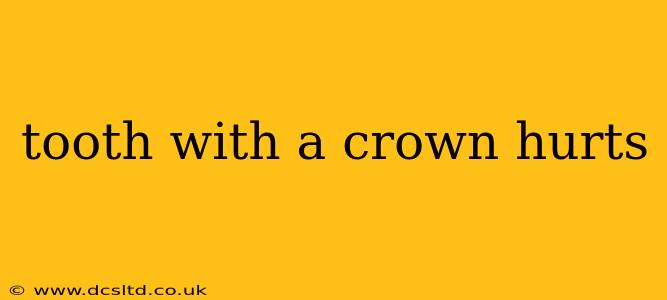A tooth with a crown hurting is a common dental problem that can stem from various underlying issues. While a crown is designed to protect and strengthen a damaged tooth, pain can still occur. Understanding the potential causes and seeking prompt professional care is crucial for effective management and preventing further complications. This comprehensive guide will explore the reasons why a crowned tooth might hurt, explore treatment options, and offer preventative measures.
Why Does My Tooth Hurt With a Crown?
The pain you're experiencing in your crowned tooth could be due to several reasons. It's important to note that the pain might not originate from the crown itself but from the underlying tooth structure or surrounding tissues.
1. Pulpitis (Inflammation or Infection of the Tooth Pulp):
Even with a crown, the tooth's pulp (the soft tissue containing nerves and blood vessels) can become inflamed or infected. This is often caused by deep decay that existed before the crown was placed, or a new cavity that has developed beneath the crown. The infection can cause intense, throbbing pain, often sensitive to temperature changes (hot or cold).
2. Periodontal Disease (Gum Disease):
Gum disease can affect the tissues surrounding a crowned tooth, leading to inflammation, infection, and pain. This often manifests as tenderness, swelling, and bleeding gums around the crowned tooth.
3. Cracked Tooth or Root Fracture:
Despite the crown, the underlying tooth might have a crack or fracture that wasn't detected or fully addressed before the crown was placed. This can exacerbate pain, especially with biting or chewing.
4. Abscess Formation:
An abscess is a pocket of pus that forms due to an infection. An abscess near a crowned tooth can cause severe pain, swelling, and tenderness to the touch.
5. Sinusitis:
Sometimes, pain in the upper teeth can be referred pain from sinusitis (inflammation of the sinuses). If your pain is accompanied by other sinus symptoms like facial pressure and congestion, this could be the cause. This is less likely to be solely associated with a crowned tooth but is important to consider.
6. Poor Crown Fit:
In rare cases, a poorly fitted crown can cause discomfort. Irritation to the gum tissue from the crown's margin can lead to sensitivity and pain.
What to Do if Your Crowned Tooth Hurts
If you're experiencing pain in a tooth with a crown, contact your dentist immediately. Delaying treatment can worsen the condition and potentially lead to more extensive procedures. Your dentist will conduct a thorough examination to diagnose the underlying cause of your pain and recommend appropriate treatment.
Treatment Options for a Painful Crowned Tooth
Treatment will vary depending on the cause of the pain. Options may include:
- Root Canal Treatment: If the pulp is inflamed or infected, a root canal may be necessary to remove the infected pulp, clean the canals, and seal the tooth to prevent further infection.
- Antibiotics: If an infection is present, your dentist might prescribe antibiotics to combat the bacteria.
- Crown Adjustment or Replacement: If the crown is poorly fitted, it may need adjustment or replacement.
- Periodontal Treatment: If gum disease is the cause, scaling and root planing (deep cleaning) may be necessary to remove plaque and tartar buildup.
- Extraction: In severe cases where the tooth is beyond repair, extraction might be the only option.
How to Prevent Pain in a Crowned Tooth
Practicing good oral hygiene is essential for preventing pain in a crowned tooth. This includes:
- Brushing and Flossing Regularly: Brush your teeth twice a day with fluoride toothpaste and floss daily to remove plaque and food particles.
- Regular Dental Checkups: Visit your dentist for regular checkups and cleanings to detect and address potential problems early.
- Avoid Hard or Chewy Foods: Refrain from biting on hard objects or chewing excessively sticky foods to avoid damaging the crown or underlying tooth.
By understanding the potential causes of pain in a crowned tooth, seeking prompt professional care, and maintaining excellent oral hygiene, you can significantly reduce your risk of experiencing this discomfort. Remember, prevention is key!
